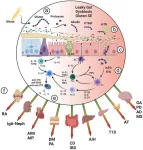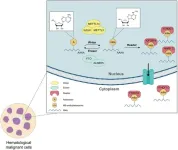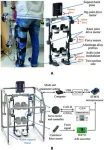(Press-News.org)
Functional Gastrointestinal Disorders (FGIDs), also known as disorders of gut-brain interaction, encompass a wide range of conditions that cannot be attributed to structural, biochemical, or organic abnormalities. These disorders vary significantly from infancy to adulthood, with distinct manifestations in neonates/toddlers and children/adolescents. The ROME criteria, updated periodically, currently in use is ROME IV, which facilitates early and accurate diagnosis of FGIDs. Despite their prevalence, pediatric FGIDs pose diagnostic and therapeutic challenges due to children's inability to articulate symptoms and the influence of developmental factors. These disorders often persist into adulthood, contributing to significant morbidity, absenteeism, healthcare expenditure, and reduced quality of life.
Pathophysiology
The exact pathophysiology of pediatric FGIDs remains elusive, though several factors have been implicated. Genetic predisposition, psychosocial stressors, gut dysbiosis, visceral hypersensitivity, and neuroimmune interactions are among the proposed mechanisms. The complex interplay between these factors leads to altered gut-brain communication, resulting in the manifestation of FGIDs.
Diagnosis
Diagnosing pediatric FGIDs can be challenging, often requiring a detailed history and thorough clinical examination. The ROME IV criteria, which are predominantly symptom-based, facilitate earlier diagnosis by excluding organic causes and minimizing unnecessary investigations. Physicians should be vigilant for red flag signs such as declining weight and height, delayed puberty, painful swallowing, persistent vomiting, bleeding, localized pain, fever, arthritis, perianal disease, and a family history of inflammatory bowel disease or celiac disease. Fecal calprotectin and celiac markers are cost-effective investigations for children with irritable bowel syndrome (IBS)-like symptoms. Early diagnosis, particularly during the first visit, significantly improves recovery outcomes.
Neonate/Toddler FGIDs
Infant Regurgitation: Involuntary movement of gastric contents occurs in 41-67% of infants between three weeks and 12 months, without retching, failure to thrive, apnea, or feeding difficulties.
Infant Rumination Syndrome: Rare, affecting 1.9% of infants, involves effortless regurgitation of food, chewed and re-swallowed, accompanied by abdominal muscle contractions.
Cyclic Vomiting Syndrome: Characterized by repetitive episodes of vomiting lasting hours to days, with episodes separated by weeks to months. It affects 3.4% of infants and children, with onset before two years warranting further investigation.
Infant Colic: Irritability, fussing, and crying without obvious cause, affecting 5-19% of infants under five months.
Functional Diarrhea: Painless, recurrent passage of four or more well-formed stools for at least four weeks in 6-60-month-old infants, affecting 6-7% of infants.
Infant Dyschezia: Involves crying and straining before passing soft stools, affecting 2.4% of infants under nine months.
Functional Constipation: Voluntary withholding of feces due to fear of unpleasant evacuation, leading to hard stools and painful defecation, affecting 3-27% of children.
Child/Adolescent FGIDs
Cyclical Vomiting: Similar to neonates/toddlers, with an estimated prevalence of 0.2-1.0%.
Rumination Syndrome: Can occur secretly in older children, without retching, and begins immediately after eating.
Functional Nausea and Vomiting: Characterized by bothersome nausea or non-self-induced vomiting, not explained by other medical conditions.
Aerophagia: Excessive air swallowing leading to belching, flatus, and abdominal distension, affecting 4.2-7.5% of children.
Functional Dyspepsia: Postprandial fullness, early satiety, or epigastric pain, common in older children.
Management
Management of pediatric FGIDs involves a multidisciplinary approach, including dietary modifications, psychosocial interventions, neuro-stimulatory therapies, and pharmacological management. Fewer trials have focused on pediatric drug-based management, highlighting the need for further research. Providing reassurance, acknowledging symptoms, educating parents, and guiding them to appropriate therapy forms the cornerstone of successful management. Early identification and appropriate treatment hold the potential for cure and improvement in quality of life.
Conclusions
Pediatric FGIDs are complex disorders with a significant impact on children's health and quality of life. The ROME IV criteria facilitate earlier and more accurate diagnosis, while the multidisciplinary approach to management offers hope for improved outcomes. Further research is needed to unravel the exact pathophysiology and develop more effective treatment strategies for these challenging conditions.
Full text
https://www.xiahepublishing.com/2994-8754/JTG-2023-00075
The study was recently published in the Journal of Translational Gastroenterology.
Journal of Translational Gastroenterology (JTG) dedicates to improving clinical diagnosis and treatment, advancing understanding of the molecular mechanisms, and promoting translation from bench to bedside of gastrointestinal, hepatobiliary, and pancreatic diseases. The aim of JTG is to provide a forum for the exchange of ideas and concepts on basic, translational, and clinical aspects of gastroenterology, and promote cross-disciplinary research and collaboration.
Follow us on X: @xiahepublishing
Follow us on LinkedIn: Xia & He Publishing Inc.
END
The interaction between humans and their environment, mediated by nutrition, plays a crucial role in regulating inflammatory responses. Chronic inflammatory diseases have been on the rise, and the scientific community has been actively exploring pro-inflammatory nutrients as potential therapeutic targets. Gluten, a major component of wheat, barley, and rye, has been implicated in numerous health issues, particularly celiac disease (CD). This review essay summarizes the key findings of a recent study published in the Journal of Translational Gastroenterology, focusing on the proinflammatory effects of gluten and its implications in autoimmunity.
Gluten and ...
While animals in drylands hone their natural senses to find vegetation, humans have developed “external eyes” to track these vital resources.
Scientists from the U.S. Department of Agriculture (USDA) Agricultural Research Service (ARS) have created an advanced method that integrates high-frequency near-surface camera data with broader satellite imagery to better monitor and assess dryland ecosystems. Their approach could aid in taking timely action to prevent land degradation, contributing to improved environmental management and conservation strategies.
Their results were published in the Journal of Remote Sensing on July 8.
Drylands, including ...
Data published today in the New England Journal of Medicine Catalyst reported that MedPearl, a Providence-developed clinician-built clinical decision platform, improves primary care clinician productivity, decreases time waste on administrative tasks and improves the quality of referrals sent to specialists.
The paper details operational outcomes from MedPearl’s use among more than 4,000 active monthly clinician users and shows statistically significant improvement in total productivity, after-hours time spent in the EMR and incremental margin per referral ...
East Hanover, NJ – August 21, 2024 – Kessler Foundation researchers have published a new clinical study investigating the effects of robotic postural stand training combined with spinal cord epidural stimulation (Stand-scES) on trunk control in individuals with high-level spinal cord injury (SCI). The open access article, “Effects of Robotic Postural Stand Training with Epidural Stimulation on Sitting Postural Control in Individuals with Spinal Cord Injury: A Pilot Study” (doi.org/10.3390/jcm13154309) was published in the Journal of Clinical ...
PITTSBURGH - Carnegie Mellon University will be a core partner in a new multi-institutional collaboration that has received $26 million from the National Science Foundation to launch an Engineering Research Center (ERC) dedicated to revolutionizing the ability of robots to amplify human labor.
Nine Carnegie Mellon University faculty members, with expertise ranging from Softbotics, engineering, and computer science to psychology, and diversity and inclusion, will help to develop highly dexterous robotic hands, user-friendly interfaces, ...
Epigenetics, the modification of chromosomes without altering DNA sequences, serves as a crucial regulatory mechanism for gene expression. Among the various epigenetic marks, N6-methyladenosine (m6A) modifications on RNA have gained significant attention in recent years for their role in various biological processes, including cancer development and progression. This article reviews the latest advances in understanding the role of m6A modifications in leukemia, a heterogeneous group of hematological malignancies.
Role of m6A Modification in Leukemia
m6A Writers and Erasers
m6A modifications ...
In an era where technology increasingly merges with healthcare to enhance patient outcomes, a groundbreaking study conducted by Fuyang Yu and his colleagues introduces an innovative approach to lower limb rehabilitation. Their research, published in Cyborg Bionic Systems, outlines the development of a lower limb rehabilitation robot designed to significantly improve the safety and effectiveness of gait training through a novel method based on human-robot interaction force measurement.
Rehabilitation robots are ...
There may be a way to slow the growth of endometrial cancer through targeted cancer cell therapy, according to new research from the University of Missouri School of Medicine.
This year, around 65,000 women are expected to be diagnosed with endometrial cancer, the most common cancer of the female reproductive organs. An increased risk in development for multiple human cancers is associated with mutations in the PTEN protein, which normally regulates cell division and growth. The mutation allows cells to multiply uncontrollably.
Using mice models, Krystina Dunston, research lab manager and NextGen Precision Health researchers Tae Hoon Kim and Jae-Wook Jeong, studied the ...
Québec City, August 21, 2024 – A research team from Université Laval has shown the benefits of camu-camu on non-alcoholic fatty liver disease, which affects over seven million people in Canada. This exotic fruit reduces liver fat levels.
Over 12 weeks, thirty participants took either camu-camu extract or a placebo at different times in this randomized clinical trial. Participants underwent magnetic resonance imaging (MRI) to determine fat levels in the liver. Scientists observed a 7.43% reduction in liver lipids when study participants took camu-camu extract. With the ...
Inside the next generation of fusion vessels known as spherical tokamaks, scientists at the U.S. Department of Energy’s Princeton Plasma Physics Laboratory (PPPL) envisioned a hot region with flowing liquid metal that is reminiscent of a subterranean cave. Researchers say evaporating liquid metal could protect the inside of the tokamak from the intense heat of the plasma. It’s an idea that dates back several decades and is tied to one of the Lab’s strengths: working with liquid metals.
“PPPL’s expertise in using liquid metals, ...





